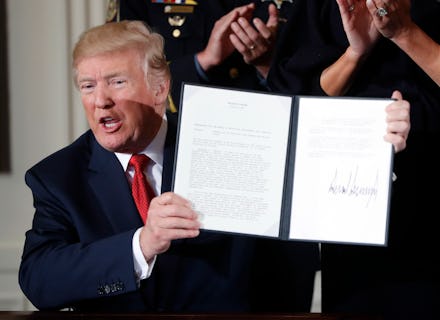Trump just declared the opioid epidemic a public health emergency. Here’s what that means.

President Donald Trump took formal action Thursday to combat the opioid crisis, instituting a public health emergency that stopped short of the national emergency he said he would declare two months ago.
Speaking from the White House, Trump promised federal approvals would come rapidly to aid first responders and health care providers treating people who are addicted to opioids. The epidemic claimed roughly 64,000 lives in 2016, killing more people than gun homicides and car accidents combined, Trump said.
“Working together, we will defeat this opioid epidemic,” Trump said. “We will free our nation from the terrible affliction of drug abuse.”
Designating the opioid crisis as a public health emergency doesn’t go as far as Trump originally promised to in August, when he said he would declare the opioid crisis “a national emergency.” That choice of words means something specific and would have gone further than Thursday’s action.
A national emergency is typically used to respond to a major natural disaster or national security threat and would free up federal dollars to pay for drug addiction treatment, help hospitals treat more people and send further resources to first responders dealing with the epidemic.
A public health emergency also makes public funds available, but it’s not the furthest Trump could go to combat the crisis.
Trump did say his move will allow health care providers, like hospitals, with more than 16 beds to begin providing treatment to people who suffer from substance abuse. He said the Justice Department will continue to crack down on Chinese and South American drug traffickers, adding that the latter was part of his justification for proposing a border wall with Mexico.
“Addressing it will require all of our effort,” Trump said. “And it will require us to confront the crisis in all of its real complexity.”
Trump promised ending the opioid overdose crisis and lessening drug use were a top priority for his White House. He said he will invest in a national anti-drug-use advertising campaign and would increase research funding for nonaddictive painkillers.
He also spoke of his family’s personal struggle with addiction. Trump’s brother, Fred Trump Jr., had a well-known alcohol addiction problem. He said his brother told him to never have a drink or smoke a cigarette — something Trump said he has stuck by to this day.
“I learned because of Fred,” the president said. He closed by saying he wants the “next generation of Americans to know a drug-free life,” stressing that America’s children should not have access to or interest in illegal drugs.
“We are going to overcome addiction in America,” Trump said. “We have no choice but to help these people who are hooked and are suffering.”